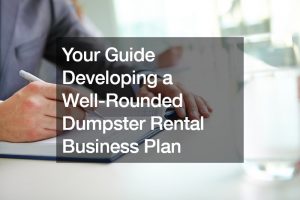
When starting a dumpster rental business, having a well-rounded dumpster rental business plan is crucial for success. A comprehensive business plan will outline your goals, strategies, and operational procedures to ensure the smooth running of your local dumpster rental services.
1. Market Research
Market research is an essential component of a dumpster rental business plan as it helps you understand the demand for local dumpster rental services in your area. By conducting thorough market research, you can identify potential customers, assess the competition, and determine the pricing and services offered by other dumpster rental companies.
To conduct effective market research for your roll off rental business plan, you can utilize online resources, conduct surveys and interviews with potential customers, and analyze industry reports. By gathering data on market trends, customer preferences, and competitor strategies, you can make informed decisions for your business.
By including detailed market research in your roll off rental business plan, you can demonstrate to investors and stakeholders that you have a solid understanding of the market and are well-prepared to meet the needs of your target audience.

2. Competitor Analysis
Competitor analysis is crucial for a roll off rental business plan as it allows you to identify the strengths and weaknesses of other dumpster rental companies in your area. By analyzing your competitors, you can identify gaps in the market, differentiate your services, and develop a competitive edge.
There are several tools and strategies for conducting competitor analysis, including researching competitor websites, analyzing customer reviews, and conducting mystery shopping. By understanding the strategies and pricing of your competitors, you can position your dumpster rental company effectively in the market.
By including a detailed competitor analysis in your dumpster rental business plan, you can demonstrate to investors that you have a clear understanding of the competitive landscape and are prepared to navigate industry challenges effectively.
3. Target Audience
Identifying your target audience is essential for a roll off rental business plan as it helps you tailor your services to meet the needs and preferences of your customers. By understanding your target audience, you can develop marketing strategies, pricing plans, and services that resonate with your ideal customers.
To identify your target audience for a dumpster rental business, you can conduct market research, analyze customer data, and create customer personas. By gathering information on demographics, preferences, and behaviors, you can create targeted marketing campaigns and personalized services for your customers.
4. Services Offered
When creating a dumpster rental business plan, it is essential to outline the types of trash dumpster rentals you will offer to customers. Whether you provide residential dumpster rental, roll off dumpsters, or waste disposal services, clearly defining your services is crucial for setting your business apart from competitors.
To differentiate your services from other dumpster rental companies, you can offer additional services such as same-day delivery of roll off dumpster rental bins, eco-friendly disposal options, or flexible rental terms. By providing unique value propositions, you can attract more customers and build a loyal customer base for your business.

5. Pricing Strategy
Setting a competitive pricing strategy is essential for dumpster roll off rental companies as it directly impacts your revenue and profitability. When determining pricing for dumpster rental services, consider factors such as the cost of equipment, labor, disposal fees, and competition pricing in your area.
To develop a pricing strategy that attracts customers and maximizes profits, you can offer discounts for long-term rentals, competitive pricing for popular dumpster sizes, and transparent pricing with no hidden fees. By providing value for money and clear pricing options, you can build trust with customers and drive sales for your business.
By outlining your pricing strategy in your dumpster rental business plan, you can demonstrate to investors that you have carefully considered the financial aspects of your business and are prepared to generate revenue in a competitive market.
6. Marketing Plan
Creating a comprehensive marketing plan is essential for a roll off rental business plan as it helps you reach potential customers, generate leads, and build brand awareness. By developing a marketing strategy that includes online advertising, social media campaigns, and local outreach, you can attract new customers and grow your business.
When creating a marketing plan for your dumpster rental business, consider the most effective channels for reaching your target audience, such as search engine optimization (SEO), pay-per-click advertising, and social media marketing. By aligning your marketing efforts with your business goals, you can drive traffic to your website and increase sales for your company.
7. Operational Plan
Developing a detailed operational plan is essential for a dumpster rental business plan as it outlines the day-to-day processes and procedures for running your business. By defining operational workflows, scheduling procedures, and quality control measures, you can ensure smooth operations and efficient service delivery for your customers.
In your operational plan, include information on equipment maintenance, inventory management, customer service protocols, and safety procedures for handling and transporting dumpsters. By detailing each aspect of your operational processes, you can demonstrate to investors that you have a well-organized and structured approach to running your business.
8. Financial Projections
Creating realistic financial projections is essential for a roll off rental business plan as it helps you forecast revenue, expenses, and profitability for your business. By developing detailed financial projections, you can estimate startup costs, operating expenses, and potential revenue streams to ensure the financial sustainability of your business.
When creating financial projections for your roll off rental business plan, consider factors such as equipment costs, labor expenses, marketing expenditures, and revenue projections based on market research and industry trends. By creating a detailed financial forecast, you can demonstrate to investors that you have a clear understanding of the financial aspects of your business and are prepared to manage your finances effectively.

9. Risk Analysis
Conducting a thorough risk analysis is essential for a dumpster rental business plan as it helps you identify potential challenges, mitigate risks, and develop contingency plans to manage unexpected events. By assessing potential risks such as equipment breakdowns, regulatory changes, and market fluctuations, you can develop strategies to minimize the impact of these risks on your business.
To mitigate risks and develop contingency plans for your dumpster rental business, consider factors such as insurance coverage, emergency procedures, and alternative suppliers for equipment and disposal services. By preparing for potential risks in advance, you can ensure the continuity of your business operations and protect your company from financial losses.
10. Legal Considerations
Addressing legal requirements and regulations is essential for a dumpster rental business plan as it ensures compliance with local laws and industry regulations. By understanding legal considerations such as permits, licenses, zoning laws, and waste disposal regulations, you can avoid potential fines, lawsuits, and reputational damage to your business.
When addressing legal considerations in your roll off dumpster business plan, consult with legal experts, municipal authorities, and industry associations to ensure that your business operations comply with all applicable laws and regulations. By demonstrating a commitment to legal compliance, you can build trust with customers, investors, and regulatory authorities while operating your business ethically and responsibly.
By including a section on legal considerations in your roll off dumpster business plan, you can show investors that you have taken the necessary steps to establish a legally compliant business and are prepared to operate in alignment with ethical standards and industry regulations.
11. Staffing Plan
Developing a staffing plan is essential for a roll off rental business plan as it outlines the roles, responsibilities, and hiring processes for your employees. By planning for staffing needs, defining job descriptions, and establishing training programs, you can build a skilled and efficient team to support your business operations.
When creating a staffing plan for your dumpster rental business, consider factors such as hiring timelines, recruitment strategies, employee retention programs, and staff development opportunities. By investing in your employees and providing a supportive work environment, you can attract top talent, improve employee satisfaction, and enhance the overall performance of your business.
By including a detailed staffing plan in your roll off dumpster business plan, you can demonstrate to investors that you have a clear strategy for building a capable and motivated team to drive the success of your business and provide exceptional service to customers.
12. Growth Strategy
Planning for growth and scaling is essential for a roll off dumpster business plan as it helps you expand your operations, enter new markets, and increase profitability. By developing a growth strategy that includes market expansion, product diversification, and strategic partnerships, you can position your business for sustainable long-term success.
To plan for growth and scaling in your dumpster rental business, consider factors such as customer acquisition strategies, revenue growth targets, and operational efficiencies. By setting clear goals and milestones for business growth, you can track progress, adjust strategies as needed, and capitalize on opportunities for expansion and profitability.
By outlining a growth strategy in your roll off rental business plan, you can demonstrate to investors that you have a clear vision for the future of your business and are committed to implementing strategic initiatives that drive growth, increase market share, and maximize profitability.
13. Sustainability Practices
Incorporating sustainability practices is important for a roll off dumpster business plan as it demonstrates your commitment to environmental responsibility and sustainable business practices. By implementing eco-friendly initiatives such as recycling programs, energy-efficient operations, and waste reduction strategies, you can attract environmentally conscious customers and position your business as a leader in sustainability.
When developing sustainability practices for your dumpster rental business, consider options such as offering green dumpster rental services, promoting waste diversion and recycling, and educating customers on eco-friendly disposal practices. By integrating sustainability into your business operations, you can reduce your environmental impact, support local communities, and differentiate your business from competitors.
By including sustainability practices in your roll off dumpster business plan, you can show investors that you are dedicated to operating a socially responsible business that prioritizes environmental stewardship and sustainability while providing high-quality services to customers.

14. Customer Feedback and Improvement
Gathering customer feedback and implementing continuous improvements is essential for a roll off rental business plan as it helps you address customer needs, enhance service quality, and build customer loyalty. By collecting feedback through surveys, reviews, and testimonials, you can gain valuable insights into customer satisfaction and make data-driven decisions to improve your services.
To gather customer feedback for your dumpster rental business, consider options such as online surveys, feedback forms, follow-up calls, and social media monitoring. By actively listening to customer feedback and responding to their suggestions, you can build stronger relationships with customers, improve service quality, and drive customer retention and loyalty.
By including a customer feedback and improvement section in your dumpster rental business plan, you can demonstrate to investors that you are committed to listening to customers, addressing their needs, and continuously evolving your business to deliver exceptional service and customer satisfaction.
15. Monitoring and Evaluation
Monitoring and evaluating the success of your roll off rental business plan is essential for measuring progress, tracking key performance indicators (KPIs), and identifying areas for improvement. By regularly reviewing financial metrics, operational performance, customer feedback, and market trends, you can make informed decisions to optimize business performance and achieve your goals.
When monitoring and evaluating your dumpster rental business, track key performance indicators such as revenue growth, customer acquisition costs, customer retention rates, and employee productivity. By analyzing data and performance metrics, you can identify trends, identify strengths and weaknesses, and make data-driven decisions to drive business success and profitability.
By including a monitoring and evaluation section in your roll off dumpster business plan, you can demonstrate to investors that you have a systematic approach to tracking business performance, evaluating outcomes, and making informed decisions to achieve long-term success and sustainability.
In conclusion, developing a comprehensive dumpster rental business plan is essential for successfully launching and growing a dumpster rental company. By incorporating research, analysis, and strategic planning into your business plan, you can demonstrate to investors and stakeholders that you have a clear vision for your business, a solid understanding of the market, and a strategic roadmap for success. With a well-rounded business plan that addresses market research, competitive analysis, target audience, services offered, pricing strategy, marketing plan, operational procedures, financial projections, risk analysis, legal considerations, staffing needs, growth strategies, sustainability practices, customer feedback, and monitoring and evaluation, you can position your dumpster rental business for long-term growth, profitability, and success in the competitive waste disposal industry.



